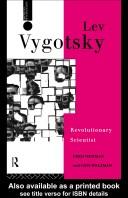| Listing 1 - 10 of 11 | << page >> |
Sort by
|
Book
Year: 2015 Publisher: London: Sage,
Abstract | Keywords | Export | Availability | Bookmark
 Loading...
Loading...Choose an application
- Reference Manager
- EndNote
- RefWorks (Direct export to RefWorks)
Book
ISBN: 9783906757889 3906757889 Year: 1997 Publisher: Bern: Lang,
Abstract | Keywords | Export | Availability | Bookmark
 Loading...
Loading...Choose an application
- Reference Manager
- EndNote
- RefWorks (Direct export to RefWorks)
Cognition --- Semiotics --- Psycholinguistics --- Vygotskiĭ, L S - (Lev Semenovich), - 1896-1934
Book
ISBN: 9782353671106 2353671101 Year: 2024 Publisher: Paris : Edition sociales,
Abstract | Keywords | Export | Availability | Bookmark
 Loading...
Loading...Choose an application
- Reference Manager
- EndNote
- RefWorks (Direct export to RefWorks)
Lev Vygotski (1896-1934) est souvent présenté comme le « Mozart de la psychologie ». Son oeuvre dialogue avec tous les grands psychologues et cherche à mettre la psychologie au service de l'émancipation. Vygotski change et jette les bases pratiques et théoriques d'une psychologie novatrice axée sur l'art, l'éducation et l'enfance déficiente. Entre pensée et langage, entre conscience et inconscient, il raccorde la vie mentale à son origine sociale. Mais l'histoire du développement psychologique marche à l'affect. On doit à Vygotski des méthodes où chacun est vu, moins pour ce qu'il est déjà, que pour ce qu'il peut devenir.

ISBN: 0415064414 9780415064415 100094171X 1134922078 1134922086 1280141956 0203977866 Year: 1993 Publisher: New York : Routledge,
Abstract | Keywords | Export | Availability | Bookmark
 Loading...
Loading...Choose an application
- Reference Manager
- EndNote
- RefWorks (Direct export to RefWorks)
The contemporary debate in psychology and politics over the possibilities for human development has fuelled a renewed interest in the early Soviet psychologist Lev Vygotsky. In "Lev Vygotsky: Revolutionary Scientist" , Fred Newman and Lois Holzman argue that Vygotsky was a revolutionary who used - and advanced - Marx's method to make extrordinary discoveries about the nature of learning, development, thinking, speaking and playing.; In this introduction to Vygoysky and Vygotskyian research, the authors draw upon their own fifteen years' work in creating Vygotsky-inspired therapeutic, educational and cultural environments. That work has produced the discovery that revolutionary activity, typical of early childhood, is the fundamental human characteristic. When revolutionary activity is arrested, not only do development and progress stop, eventually even adaptation to society becomes impossible.; "Lev Vygotsky: Revolutionary Scientist" is intended for undergraduate as well as advanced students in psychology, linguistics, education and philosophy.
Psychologists --- History --- Vygotskiĭ, L S --- Psychologists - Soviet Union - History --- Vygotskiĭ, L S - (Lev Semenovich), - 1896-1934 --- History. --- Vygotskii, L. S.
Book
ISBN: 9780367759667 0367758962 0367759667 9780367758967 Year: 2024 Publisher: New York Routledge
Abstract | Keywords | Export | Availability | Bookmark
 Loading...
Loading...Choose an application
- Reference Manager
- EndNote
- RefWorks (Direct export to RefWorks)
Now in its third edition, this classic text remains the seminal resource for in-depth information about major concepts and principles of the cultural-historical theory developed by Lev Vygotsky, his students, and colleagues, as well as three generations of neo-Vygotskian scholars in Russia and the West. Featuring two new chapters on brain development and scaffolding in the zone of proximal development, as well as additional content on technology, dual language learners, and students with disabilities, this new edition provides the latest research evidence supporting the basics of the cultural-historical approach alongside Vygotskian-based practical implications. With concrete explanations and strategies on how to scaffold young children’s learning and development, this book is essential reading for students of early childhood theory and development.
Book
ISBN: 9460916945 9460916961 9786613696182 1280785799 Year: 2011 Publisher: Rotterdam : SensePublishers : Imprint: SensePublishers,
Abstract | Keywords | Export | Availability | Bookmark
 Loading...
Loading...Choose an application
- Reference Manager
- EndNote
- RefWorks (Direct export to RefWorks)
In this book Peter Smagorinsky reconsiders his many publications employing Vygotsky’s theory of culturally-mediated human development and applies them, through a unified and coherent series of chapters, to literacy research. This exploration takes previously-published work and incorporates it into a new and sustained argument regarding the application of Vygotsky’s ideas to current questions regarding the nature of literacy and how to investigate it as a cultural phenomenon that contributes to human growth in social context. To conduct this inquiry, Smagorinsky first provides an overview that contextualizes Vygotsky both in his own time and in efforts to extrapolate from his Soviet origins to the 21st Century world. This consideration includes attention to the current context for literacy studies. He then reviews current conceptions of literacy in the realms of reading, writing, and additional tool use, grounding each in a Vygotskian perspective. The book’s final chapters take a critical look at both research method and the writing of research reports, taking into account both research and research reports as social constructions based in disciplinary practices. On the whole, this volume makes an important contribution to Vygotskian studies and literacy research through the author’s careful alignment between theory and practice.
Literacy -- Research. --- Literacy -- Social aspects. --- Social psychology. --- Vygotskii, L. S. (Lev Semenovich), 1896-1934. --- Education --- Social Sciences --- Education, Special Topics --- Education. --- Literacy. --- Illiteracy --- General education --- Literacy --- Research.

ISBN: 1282873520 9786612873522 1441122257 9781441122254 9780826443083 0826443087 9780826490711 0826490719 9781474212113 1474212115 9781282873520 Year: 2008 Publisher: London : Continuum International Publishing,
Abstract | Keywords | Export | Availability | Bookmark
 Loading...
Loading...Choose an application
- Reference Manager
- EndNote
- RefWorks (Direct export to RefWorks)
'The editor and authors in this volume make a convincing case for focusing on advanced foreign language instruction. Importantly, they invite consideration of this focus as an opportunity to re-examine conventional definitions of the target of instruction. In so doing, readers also learn more about the theories highlighted in this volume, and their capacity to enhance our understanding of advancedness and its development within an educational context. This book thus mediates between linguistic and language learning theories and educational practice, modelling the very best of what applied ling
Book
ISBN: 9783110695717 3110695715 3110695855 Year: 2022 Publisher: Berlin ; Boston : De Gruyter,
Abstract | Keywords | Export | Availability | Bookmark
 Loading...
Loading...Choose an application
- Reference Manager
- EndNote
- RefWorks (Direct export to RefWorks)
Our understanding of CS Peirce, and his semiotics, is largely influenced by a twentieth century perspective that prioritizes the sign as a cultural artifact, or as one that that 'distorts', in some way, our understanding of the empirical world. Such a perspective will always undermine appreciation of Peirce as a philosopher who viewed signs as the very mechanisms that enable us to understand reality through concept formation.The key to this repositioning of Peirce is to place his work in the broad frame of Hegelian philosophy. This book evaluates, in detail, the parallels that exist between Peircean and Hegelian thought, highlighting their convergences and also the points at which Peirce departs from Hegel's position. It also considers the work of Vygotsky on concept formation showing that both are, in fact, working within the same Hegelian template.This book, therefore, contributes to our broader understanding of Peircean semiotics. But by drawing in Vygotsky, under the same theoretical auspices, it demonstrates that Peirce has much to offer contemporary educational learning theory.
Book
ISBN: 9782711630493 2711630498 Year: 2022 Publisher: Paris : Librairie philosophique J. Vrin,
Abstract | Keywords | Export | Availability | Bookmark
 Loading...
Loading...Choose an application
- Reference Manager
- EndNote
- RefWorks (Direct export to RefWorks)
"Comment éduquer un enfant? Renversons la question et demandons-nous d'abord ce que l'enfant, qui est pourtant dans un état de dépendance, peut faire par lui-même: ce qu'il peut, avec l'aide d'autrui, pour se transformer et devenir autre que lui-même. Il nous faut à cette fin élaborer une ' anthropologie de l'enfance ' qui considère par quelles voies, physiques et psychiques, l'enfant conquiert sa liberté. Vygotski, avec l'appui de Spinoza dont il use tout au long de son œuvre, nous y aide: il nous permet de penser la puissance affective du développement conceptuel de l'enfant, et de jeter les bases d'une psychologie spinoziste des affects, dont la pierre de touche est la peržeivanie, expérience vécue pouvant devenir de plus en plus vivante." Source : couverture
Child development --- Education --- Psychology and philosophy --- Self-realization --- Philosophy. --- Philosophy --- Vygotskiĭ, L. S. --- Spinoza, Benedictus de, --- Influence. --- Spinoza, Benedictus de, 1632-1677 --- Vygotskiĭ, L. S. (Lev Semenovich), 1896-1934

ISBN: 0306436566 148992616X 1489926143 9780306436567 Year: 1991 Publisher: New York (N.Y.): Plenum,
Abstract | Keywords | Export | Availability | Bookmark
 Loading...
Loading...Choose an application
- Reference Manager
- EndNote
- RefWorks (Direct export to RefWorks)
Social psychology --- Vygotsky, Lev Semënovic --- Psychology --- Vygotskiĭ, L S --- Vygotskii, L. S. --- Psychology. --- Social psychology. --- Vygotskiĭ, L. S. --- Vygotskiĭ, L. S., --- Behavioral sciences --- Mental philosophy --- Mind --- Science, Mental --- Human biology --- Philosophy --- Soul --- Mental health --- Mass psychology --- Psychology, Social --- Human ecology --- Social groups --- Sociology --- Vygotskiĭ, L. S. --- Wygotski, Lew Semjonowitsch, --- Vygotsky, L. S. --- Vygotskiĭ, Lev Semenovich, --- Vygotsky, Lev Semenovich, --- Vygotskij, Lev Semenovic, --- Wigotsky, L., --- Vigotski, Lev S., --- Vigotski, L. S. --- Wei-ko-tzʻu-chi, Lieh Hsieh, --- Wygotski, L. S. --- Vygotski, Lev Sémionovitch, --- Выготский, Л. С. --- ויגוצקי, לב, --- Vigotszkij, L. Sz., --- Vygotskiĭ, L S - (Lev Semenovich), - 1896-1934
| Listing 1 - 10 of 11 | << page >> |
Sort by
|

 Search
Search Feedback
Feedback About UniCat
About UniCat  Help
Help News
News